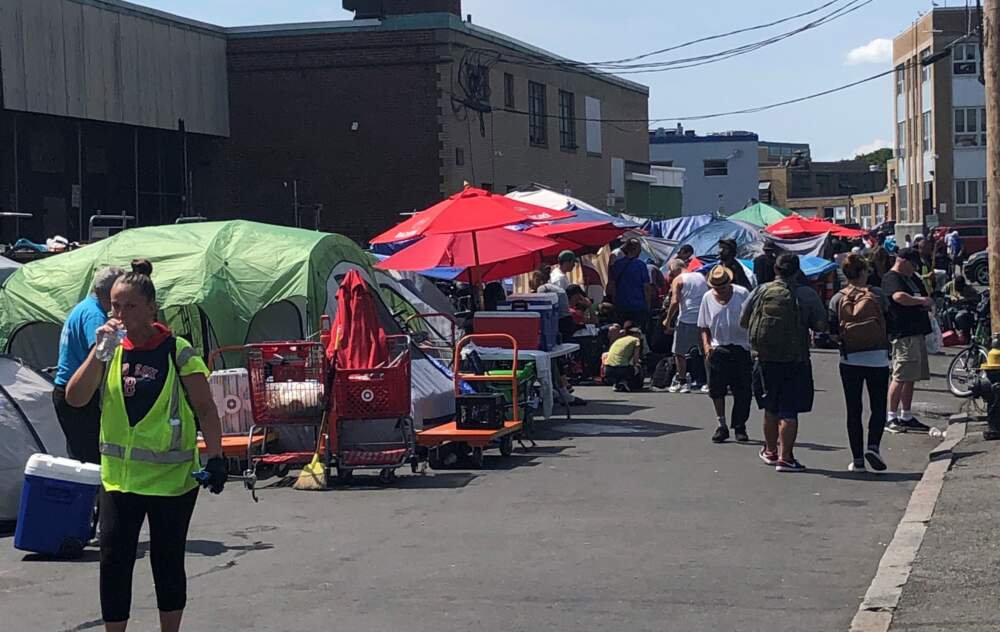Advertisement
Pressure on Mayor Wu to take action on Boston's 'Mass. and Cass' encampment reemergence

A tent encampment has returned to the area of Boston known as "Mass. and Cass," amid reports of increasing violence in the area.
The intersection of Massachusetts Avenue and Melnea Cass Boulevard has long been the site of a devastating slice of the nation's opioid epidemic, with hundreds of people camped out — many using and dealing drugs in plain sight.
Boston Mayor Michelle Wu had cleared tents from the area in 2022, shortly after taking office. She promised a public health approach to help the people there struggling with mental health issues, addiction and homelessness. This week, Wu said that due to the increased violence and lawlessness in the area, she plans to take a new approach. She has yet to reveal the details of her plan.
The Boston Public Health Commission said it is "re-evaluating its approach" to the "worsening crisis" at Mass. and Cass, to better respond to the public safety issues there.
Many of those who frequent the area say they're eager to see what the mayor proposes, because her initial strategy hasn't worked.
This week, dozens of tents were crowded onto a cordoned-off, two-block area of Atkinson Street, in front of a homeless shelter and not far from the Suffolk County jail. Several tents contained decorations and had air mattresses inside. Dozens of people were sitting in the hot sun in wheelchairs. Many people were openly smoking or injecting drugs, some nodding off in the street.
"It's worse now than it's ever been in terms of the atmosphere and the level of violence and anarchy," said Sue Sullivan, executive director of the Newmarket Business Association, a group that advocates for businesses in the neighborhood.
Boston police say they are responding to more violence around Mass. and Cass and finding more weapons than ever before. For the first time, the Boston Health Care for the Homeless Program — a pioneer in tending to the city's unhoused and unhealthy population — has stopped sending its outreach workers to the neighborhood. The group declined to comment further on that move for now.
Advertisement
Some people are asking for more law enforcement; others say more social services, treatment and housing are needed.
Boston City Council President Ed Flynn asked the city to declare a public health and public safety emergency.
"With that emergency declaration, I believe the city and other authorities would take it to the next level," Flynn said, "in terms of working to enhance services, programs and also the importance of public safety and law enforcement in that area."
State Sen. Nick Collins called for more support for law enforcement in the Mass. and Cass area — and for "bold action."
"We can no longer sit by and watch as part of our city and commonwealth descends into a disgraceful vortex of drugs, human trafficking, toxic waste and violence," Collins said in a statement. "Law enforcement needs to be supported so they can intervene appropriately."
State Rep. John Moran urged State Police and Boston police to aggressively patrol the area and detain those with outstanding criminal warrants. He's written a letter to both police agencies, urging them to arrest more people and not allow tents to be put up on the streets.
The Boston Police Patrolmen’s Association said it's eager to work with the city. The union said the six to 10 officers patrolling the area now are just a band-aid and cannot do all that needs to be done to keep order among the hundreds of people staying on the streets.
"I'm not saying we can arrest our way out of this," union president Larry Calderone said. "We look forward to working with Mayor Wu on solutions."
Some of those in the encampment on Atkinson street set up areas in front of tents where they're selling food or cigarettes.
"Get your cold sodas here, get your Newports, red and green," one man yelled out.
Jim Stewart with SIFMA, a group advocating for safe consumption sites for people to use drugs under medical supervision, is among those who still visit Mass. and Cass. A few volunteers from religious groups also could be seen going tent to tent, handing out bottled water and cookies.
Stewart suggested more law enforcement is not the answer, and that the city and state should be offering more medical and mental health services, as well as housing.
"In what definition of a commonwealth or an advanced society," Stewart asked, "would people who clearly have physical disabilities compounded by mental health challenges be expected to live in these situations?"
This article was originally published on August 04, 2023.
This segment aired on August 4, 2023.
